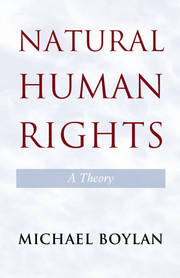Book contents
- Frontmatter
- Dedication
- Contents
- Preface
- Acknowledgments
- Part One Conceptualizing Human Rights
- Part Two Justifications for Human Rights
- Part Three Applications of Human Rights
- Scherzo
- 8 War Rape
- 9 Political Speech
- 10 LGBT Rights
- Rondo“The Game”
- Afterword: The Politics of Change
- Glossary
- Bibliography
- Index
- References
10 - LGBT Rights
Published online by Cambridge University Press: 05 September 2014
- Frontmatter
- Dedication
- Contents
- Preface
- Acknowledgments
- Part One Conceptualizing Human Rights
- Part Two Justifications for Human Rights
- Part Three Applications of Human Rights
- Scherzo
- 8 War Rape
- 9 Political Speech
- 10 LGBT Rights
- Rondo“The Game”
- Afterword: The Politics of Change
- Glossary
- Bibliography
- Index
- References
Summary
Lesbians, gays, bisexuals, and transgendered (LGBT) human beings seek the acceptance that will allow them to pursue their dreams and participate openly in the communities in which they live. This can involve many levels of natural human rights. Acceptance itself would be a level-one secondary good. The opportunities denied to individuals because they fit into the LGBT group constitute a level-two basic good. Finally, the violence perpetrated against LGBT individuals constitutes a level-one basic good. This chapter first briefly examines the problem and then applies the natural human rights theory that I have presented to suggest worldview alteration and policy responses.
The Facts in the World Today
So how is it to be LGBT in the world today? The answer is mixed. It’s generally bad. There are some countries and regions in which real progress is being made in social recognition of the legitimate human rights claims for LGBT individuals. Most of the buzz has been about homosexuals, but transgendered individuals have, perhaps, the hardest road to travel and are among the least protected groups in the world. Consequently, they have one of the highest suicide rates. For example:
On April 18 [2011] a transgendered woman named Chrissy Lee Polis went to the women’s bathroom in a Baltimore County McDonald’s. When she came out, two teenage girls approached and spat in her face. Then they threw her to the floor and started kicking her in the head. As a crowd of customers watched, Polis tried to stand up, but the girls dragged her by her hair across the restaurant, ripping the earrings out of her ears. The last thing Polis remembers, before she had a seizure, was spitting blood on the restaurant door. The incident made national news – not because this sort of violence against transgender people is unusual, but because a McDonald’s employee recorded the beating on his cell phone and posted the video on YouTube.
Violence against the LGBT community varies from official death penalties in Iran, Saudi Arabia, Yemen, United Arab Emirates, Sudan, Nigeria, and Mauritania to active official persecution in Bulgaria, Brazil, Iraq, Senegal, South Africa, Uganda, and Colombia. Unofficial violence against the LGBT community occurs in virtually every country on earth.
- Type
- Chapter
- Information
- Natural Human RightsA Theory, pp. 244 - 255Publisher: Cambridge University PressPrint publication year: 2014



